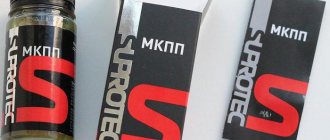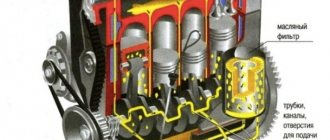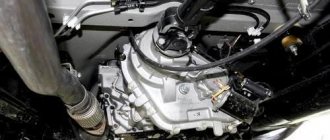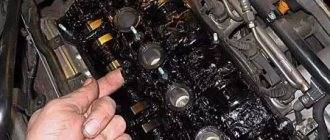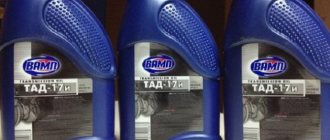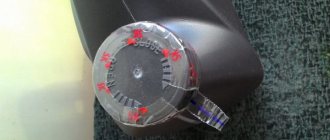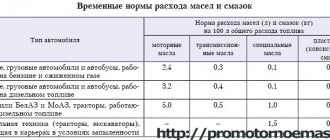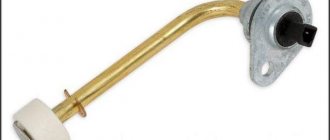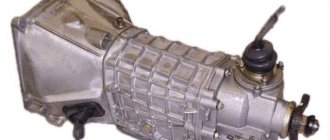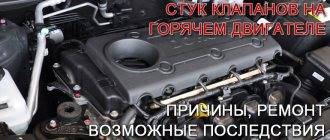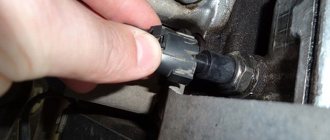Regardless of the brand of the car, at a certain point in time the engine begins to consume a significant amount of engine oil, as a result of which the exhaust gases become excessively smoky. In such situations, many car owners resort to various additives.
The advisability of using such substances is ambiguous, and motorists have diametrically opposed opinions on this matter. Moreover, the car market now has a huge range of these additives with different chemical properties.
Opinions of supporters and opponents of the use of additives
- Proponents of the use claim that they have learned from their own experience that the addition of these substances has helped reduce engine oil loss and helps achieve positive results.
- The opposing side argues that additives play no role in regulating oil consumption. Problems with excessive oil consumption and excessive smoke in exhaust gases are associated with wear and tear on the main parts of the engine. And additives are no help here. After all, it is necessary to carry out a comprehensive engine overhaul.
In addition, some car enthusiasts directly state that the use of additives is dangerous for the further operation of the engine. In their opinion, such substances only complicate existing engine problems. Based on such diametrically opposed opinions, it is necessary to understand this difficult issue in more detail.
Additives that increase compression
They are useful for those car engines that have not yet acquired high mileage. Additives easily equalize compression in all cylinders. Their task is to smooth out areas of the motor and eliminate leaks. To do this, a special mixture eliminates all irregularities inside the walls. Such additives include a special building material, which allows you to level the walls in order to restore compression in the cylinders and eliminate leaks.
It is not recommended to pour additives into new engines, as this will only be a waste of money; new engines simply do not need it.
The main reasons for increased engine oil consumption
When an engine begins to consume a lot of oil, experts point to the following possible reasons for this phenomenon:
- Using the wrong type of engine oil or poor quality lubricants.
- Significant wear of parts of the cylinder-piston mechanism.
- Deep seating of piston rings.
- Serious leakage of seals and seals.
- Oil penetration into the exhaust system through the turbocharger.
- Penetration of oil into parts of the cooling system.
As can be seen from the reasons listed above, oil leakage with additives alone will be difficult to correct if there are even several such reasons in the unit. In most cases, the engine will need to be seriously overhauled.
Good to know: Additives for increasing engine oil pressure
But if the engine has a slight level of wear, then many motorists tend to solve the problem by using additives. And in some cases they bring good results. The engine stops smoking, its operating noise decreases, and compression increases to the required level.
Active ingredient and principle of action
They contain special components based on a synthetic molybdenum-organic complex with microceramic additives. According to the developers, such substances perform the following functions when they enter the unit:
- Formation on the surfaces of parts of a stable and stable layer resistant to mechanical loads.
- Tightening microcracks and scratches in order to restore the original (original) dimensions of parts and reduce their wear.
- The additive is capable of decoking the engine, as well as piston rings. At the same time, the engine is completely cleaned of dirt and various deposits.
- As a result, engine oil consumption is reduced and the optimal compression level is restored.
- According to the creators of the additives, their use does not change the chemical and physical properties of the motor oils used.
From the point of view of theory and test research, the above technical features look quite decent. Well, now let’s take a practical look at the quality of work of the above-mentioned additives.
Choosing additives for engine oil
Date of publication: April 13, 2020. Today, on the shelves of auto stores there are a large number of liquids that help extend the life of a car engine. One of these means is oil additives for a diesel engine or gasoline engine. Such additives perform a wide variety of functions and can reduce or increase the viscosity of the lubricating fluid, clean and protect surfaces from corrosion and other deposits. There are additives that prevent oxidative processes, reducing compounds and many others. However, you should not rely entirely on supplements, as they have not only advantages, but also their disadvantages.
Even the best engine additive is not needed if your car is in perfect condition and was just purchased from a car dealership. In this case, using supplements is as logical as filling perfectly healthy teeth for a child.
Therefore, when operating a new car, it is enough to promptly change the engine oil and coolant and use new oil filters every time you fill the lubricant. But if we are talking about a car with a mileage of more than 100,000 kilometers or a used car whose engine condition is in doubt, then additives can be very useful and sometimes necessary. The most effective of them are considered to be remetallizants, which have the most beneficial effect on the engine. To determine which additive is best to pour into the engine, we will consider good (and not so good) compositions.
What are additives for increasing engine life (remetallizants)
By and large, it is difficult to call such compositions additives, since they do not dissolve in oil, but act as a “reanimator” of the engine. It would be more correct to call them remetallizers, revitalizants or atomic oils, but most often car enthusiasts classify them as additives.
This is not entirely correct, since they do not have any effect on the lubricating fluid, unlike most analogues, as a result of which you do not have to worry that the oil poured into the engine will react with the additive and behave in an unpredictable way.
A bonus from using these “drugs” is a reduction in oil consumption and an increase in engine life. They mainly consist of abrasive particles, such as nanodiamond powder, SiO2, SiC and others. Let's look at the most popular formulations.
Suprotec
One of the most popular additives of this type is the Suprotek engine additive. This composition has proven itself in the market and, judging by the reviews of car owners, is a necessary additive. It would be more correct to call Suprotec a tribological composition (tribology studies the processes of friction and aging of lubrication of parts), which affects all metal surfaces of the system. Due to the fact that the additive is based on a metal-clad composition, the engine surfaces are cleaned of accumulated plaque and corrosion and are covered with a fairly thick protective layer.
As a result, all minor defects, cracks and scratches are “healed”, and the life of the motor increases.
The Suprotek additive contains finely dispersed minerals of natural origin, which are also responsible for the formation of a protective film and prevent excessive friction. Moreover, the film is particularly durable. For example, a car can run at high speeds without engine oil for about an hour and nothing will happen.
Hado
The Hado engine additive differs from Suprotec, as it operates on a slightly different principle. This liquid contains revitalizant granules, which enter the engine along with the oil. After this, the additive particles are directed to the most vulnerable parts and surfaces, forming a cermet layer only on damaged areas. Suprtek covers all metal surfaces, regardless of their condition. Returning to Hado, it is worth adding that these additives perform well in cases of pressure problems in the engine.
Car enthusiasts who tested various compositions to solve problems with increased gaps between the connecting rod journals and bearings noted the advantage of this liquid.
Therefore, if you need an additive to increase engine oil pressure, then you should pay attention to Hado Vita Flush.
Resource
The resource is an engine additive, which is a relatively new remetallizer, the basis of which is nanoparticles, an alloy of copper, tin and silver. The lubricant helps protect rubbing parts, which will increase engine life. By and large, the prefix “nano” does not play any role here. No superfluous properties were discovered during the testing of this additive; some car enthusiasts did not notice any changes in engine performance at all. But official representatives conducted a bunch of tests in accordance with GOST and claim that this additive is practically a breakthrough. In fact, other than the low cost, there is nothing remarkable about the Resource.
Liqui Moly
This molybdenum engine additive appeared back in the 40s and was actively used in aviation and the army. Thanks to molybdenum disulfide (MoS2), in the event of oil loss, the “vital” vehicle systems were always protected. Today, many car owners, when deciding which additives are best to pour into a diesel engine, use this particular composition, since it is considered the most suitable. It protects the busiest mechanisms of the system from wear. The principle of operation is the same - the composition envelops the contacting parts and prevents their friction. Today, Liqui Moly diesel fuel additive is considered the most stable. It, like other “reanimators”, does not dissolve in motor oil and, accordingly, does not enter into any reactions with it. By and large, liquid molybdenum (this is how Liqui Moly is translated) is considered the biggest breakthrough in mechanical engineering, and all the stability tests carried out indicate that this particular composition best meets the requirements of the motor.
If we talk about which engine additive is better, then preference should definitely be given to Liqui Moly formulations, since they have passed the most important test - over time and to this day, additives based on molybdenum sulfide are actively used in aviation.
When using any of the “reanimators”, there are several important points to remember.
What to remember before using remetallizant
When using additives of this type, it is important to know that simply pouring liquid into the engine is not enough; it is necessary to carry out a whole range of measures so that the composition really begins to work as you expect from it. To do this, before pouring the remetallizant, you must:
- Wash the engine and change filters. To avoid sedimentation of the product in the crankcase, you must leave the engine idling for at least 15-20 minutes after you have filled in the additive. This time is necessary for the composition to settle on surfaces and begin to form a protective film.
- It is necessary to clearly calculate when you plan to fill the composition, since immediately after the remetallizant is in the engine, you cannot change the engine oil. The protective coating will be fully formed only after 1500-2000 kilometers.
- After several thousand kilometers, you can replace the lubricating fluid as usual. The protective layer will not be damaged in any way.
- In order to consolidate the result, it is recommended to refill the remetallizant after 50 - 100 kilometers. There is no point in doing this more often.
With proper use of such additives, you can improve cylinder sealing, increase compression, and reduce fuel and engine oil consumption. In addition, “reanimators” not only retain their properties, but are also capable of regenerating. This means that if new cracks or defects appear on the protective film, they will “overgrow”. To select the correct composition of the additive, it is best to use the fluid for your engine type, taking into account the car model, drive and year of manufacture.
In custody
A correctly selected additive will increase the service life of the engine, but it is worth understanding that the elixir of youth has not yet been invented either for a person or for his car, so you should not rely entirely on the miraculous effects of the remetallizant. If problems arise with the motor, it is best to try to solve them by repairing the damaged parts. If the condition of the engine leaves no hope, then the only way to revive it is with the help of additives.
Positive and negative aspects of using additives
According to the studied reviews of motorists and research from scientific centers of the country, the following positive methods of using additives in the engine to normalize the level of lubricants have been formulated:
- The additive should be used if the car’s oil level has dropped sharply and there is no way to top it up.
- The additive can extend the operation of an old and rather worn-out engine for a certain period of time if it is not possible to repair it in the near future.
- The additive can save the motorist 0.8-1.1 liters. oils every 170-190 km.
Having described the main advantages, we should move on to their disadvantages:
- Additives can reduce oil consumption only for a short time and with unpredictable consequences for the internal combustion engine.
- The use of additives provokes the accumulation of deposits on the internal surfaces of the unit, which are very difficult to remove.
- Unit parts are difficult to grind and boring after exposure to additives. Basically, such parts require mandatory replacement.
- Complete (overhaul) repairs of a unit containing additives cost 36-46% more than the same engine that operated in normal cyclic mode.
The main task of additives from RiMET
There are several types of anti-wear agents for your car's engine and transmission. Their action is aimed at restoring the technical performance of the car and maintaining the vehicle’s performance at the proper level. The use of additives not only increases the service life of the engine, but also restores its former strength and power. RiMET products help to increase the safety margin of the power plant.
In order for this effect to be achieved as much as possible, it is advisable to use additives at the end of the engine break-in and then continuously during the operation of the vehicle. The correct use of reducing agents allows not only to improve the performance of engine components, but also to ensure reliable protection, which is a characteristic feature of all additives from Rimet.
How are these tools useful and what can they do?
· restore the correct geometry of engine parts that come into contact and are subject to wear;
· reduce the friction force between rubbing surfaces;
· fuel burns to the maximum, increasing engine efficiency;
· the lubricity of motor and transmission oils increases;
· preventive impact on the technical condition of the engine and restoration of initial parameters.
If the car begins to consume more oil, its driving dynamics noticeably worsen, which means it’s time to remember the existence of additives for engine restoration. Updating the engine is easy and simple; just add a liquid preparation to the engine oil. As a result, the structure of the lubricant does not change, the mineral composition of which, under the influence of high temperatures and pressure, forms microscopic particles that act as a reducing agent.
The damaged surface is restored, engine efficiency increases, and the car continues to operate for a long time.
There are several types of RiMET additives:
· to reduce noise in a manual transmission;
· additive in automatic transmission (automatic transmission);
· for a gearbox on the rear axle of a car;
· separate additive for diesel;
· from excessive consumption of lubricants.
All of them are capable of preventing the appearance of harmful deposits on engine parts, reducing wear of rubbing parts, extending the life of the engine, and neutralizing acids and oxidation products.
Advice. For additives to work effectively, the engine must be flushed first. Also perform flushing when replacing the old lubricant with a new one, filling in a different type of oil, a slight knocking sound in the engine, an increase in oil consumption, or after completing engine overhauls.
Washing is carried out in two ways using special additives and a washing solution. The first is used to change used lubricant. A flushing solution is required when new oil needs to be added. The engine is cleaned of side accumulations and carbon deposits using special decarbonizing agents. It effectively removes harmful impurities from piston rings and combustion chamber walls. There are 3 methods for cleaning an engine by decoking: soft, hard and indiscriminately. In the third case, the product is added to the oil and the car continues to be used. After 300 kilometers of travel, the lubricant is replaced with fresh one.
The best additives on the domestic market
Hi-Gear OIL Treatment Old Cars & Taxi
Advantages of this additive:
- recommended for engines with high mileage;
- preserves the surface of parts;
- the additive works up to 4900 km. mileage;
- friction of parts is reduced while compression is increased and oil consumption is reduced;
Liqui Moly Oil Additive
Has the following positive aspects:
- reduces friction of parts;
- extends engine life;
- reduces oil consumption;
- reducing the noise of a running engine;
- Suitable for different types of engines.
Which engine additives are better - offers from the automotive chemicals market
Liqui Moly Ceratec
Liqui Moly is one of the few companies that use mineral additives (also known as friction geomodifiers) directly in the production of oils. In fact, molybdenum disulfide gave the brand its name. Well, the company's experience already gives certain grounds for trust.
Ceratec is a composite composition based on boron nitride and the same molybdenum disulfide (not directly stated, but found in oil samples); the manufacturer claims an increase in the antifriction and extreme pressure properties of the oil, which persists after changing it. In practice, the additive is indeed capable of demonstrating a decrease in fuel consumption and an increase in indicated power, but in reality the car owner will only feel the first. In laboratory samples of waste from different cars, a low aluminum content is visible - one can assume a decrease in wear of pistons and liners, but a radical decrease in the iron content (wear products of cast iron liners and crankshaft journals) is not observed when compared with samples of the same oils without additives.
Suprotec
Alas, in many ways the manufacturer is playing against itself - thanks to aggressive marketing (including blatant advertising on forums and reviews), it is not easy to separate the truth from the chaff. What can be said for sure about the effectiveness of the composition is the same reduction in fuel consumption and an increase in power within a few percent, which is not something unusual for anti-friction packages. A decrease in the content of aluminum and iron in the analysis of mining was not noticed enough to talk about a real improvement in the protection of engines with high mileage.
MANNOL Molibden Additive
An analogue of the well-known compositions from Liqui Moly is a suspension of fine molybdenum disulfide powder in mineral oil. In the same way, it provides a certain increase in efficiency and an increase in power within the limits of measurement error. Can be used in engines with an increased risk of damage (sports, air cooling in hot climates).
Totek MK-02
The manufacturer has declared a traditional set of characteristics, but does not indicate complete incompatibility with engines requiring the use of LowSAPS oils (diesel with particulate filters) - exhaust samples show a significant increase in phosphorus, zinc and calcium compounds, which is unacceptable for such engines. At the same time, analyzes give reason to assume that the package of antifriction additives is based on a mineral base. The content of aluminum and iron in the waste is within normal limits. The presence of an ester base in the composition will in practice reduce engine noise - however, the same can be achieved by immediately using oil on this basis.
Generalized conclusions on the issue under study
- Based on the above arguments, we can conclude that when using an additive, reducing oil consumption in the engine is achieved by creating a protective film on worn parts. And most importantly, this effect does not last very long.
- When using additives, an inevitable change in the chemical composition of the engine oil occurs, which negatively affects engine performance. After all, the power unit of a car contains a large number of moving parts with minimal clearance between them. Therefore, for its normal operation, you need to use the recommended brand of engine oil.
- Use gives a temporary effect with unpredictable consequences for the unit as a whole.
- To solve problems with the oil level and smoky exhaust gases, it is necessary, first of all, to carry out a major overhaul of the engine in order to completely remove all the original causes of subsequent problems.
- The effect in material terms can only be achieved if additives are used for an engine that has completely used up its resource and this procedure will only continue its operation a little.
In the review of “additive for the engine so that it does not eat oil and does not smoke,” we looked at the best and optimal additives that can be purchased on the domestic market. We also ask you to leave feedback in the comments about the additives you use.
Main characteristics of additives
Manufacturers of additives promise to eliminate increased oil consumption not only radically, but also in the shortest possible time. However, you should not rely too much on what the advertisement says. In certain cases, it may even be unsafe to use such additives due to the chemically active components and substances they contain. If you suddenly want to pour an additive into an engine that is too dirty, then be prepared for the possibility of rings or valves jamming due to significant volumes of deposits and soot.
As practical reviews indicate, real help can be provided by Liqui Moly brand products, which enjoy a well-deserved reputation around the world. The main properties that their products have are:
- creating a protective film for metal rubbing parts for up to 50,000 kilometers;
- reduction of noise emitted and its tendency to overheat;
- wear of all metal components is reduced;
- excellent interaction with most engine additives;
- just 300 grams of the composition - and you will forget that your car’s engine is mercilessly smoking.
